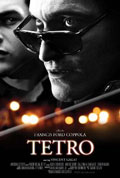
Directed by
Francis Ford Coppola
127 minutes
Rated M
Reviewed by
Bernard Hemingway

Tetro
Synopsis: Bennie Tetrocini (Alden Ehrenreich), an 18-year-old waiter on a luxury cruise ship takes shore leave in Buenos Aires, looking for his older brother, Angelo (Vincent Gallo), who left the family home years earlier to be a writer. Now calling himself Tetro and living in a crummy flat with his girl-friend (Maribel Verdú), a former psychologist he met while in the bug house, Angelo is not so happy to be reminded of things he has tried to put behind him.It is both completely understandable and disgraceful that Francis Ford Coppola’s film did not get an Australian theatrical release. Understandable because it is a wildly self-indulgent film from a director well-known for self-indulgence, disgraceful that we did not get a chance to see such a gloriously composed work on the big screen. From the opening shot of a bus making a night-time stop in the streets of Buenos Aires it is difficult not to think of the Orson Welles-Greg Tolland collaboration on Citizen Kane so extraordinary is the richness of cinematographer Mihai Malaimare Jr.’s (largely) black and white photography. Malaimare who also shot Coppola’s previous film, Youth Without Youth (2007), packs more compelling imagery into this film than you will see in four or five other very good films of today put together. Unfortunately there the Wellesian comparison dries up for dramatically the content is simply overwhelmed by the form.
The other film that you are likely to be reminded of is The Godfather for Tetro (which means "gloomy" in Italian) gradually reveals itself to be a family melodrama on a grand scale. Tetro's mother was a operatic diva, his overbearing father (Klaus Maria Brandauer) a famous composer who outstripped his older brother and teacher (also played by Brandauer), a conductor who lives in his shadow. Slowly we learn of the dark secrets hiding in the family’s bosom. Coppola throws everything at this, including flash backs, dream sequences, inserts of Powell and Pressburger's Tales of Hoffmann and a drag version of Faust,
Thes elements are quite marvellously inventive, well worthy of the director at his best but the problem is that we can’t get away from the mundane squabbles of the ill-tempered Tetro, his long-suffering girlfriend and his devotedly wide-eyed brother. I’m a big fan of Gallo whose Buffalo 66 (1998) is as good as indie film-making gets and both Verdú and Ehrenreich (who looks remarkably like a young Leonardo DiCaprio) are engaging but this triumvirate is more like the hipster slackers from a Jim Jarmusch movie than anything suited to the grandiosely Olympian story of artistic rivalry, tyranical genius and the tragic hand of fate that frames their carryings-on. By the latter stages of the film, when they are all off to attend an arts festival in the snowy heights of Patagonia presided over by legendary drama critic, Alone (Carmen Maura) one starts to wonder if Coppola is spoofing his own story as a former wunderkind or has simply abandoned any critical perspective whatsoever.
After the ponderously confused Youth Without Youth I suspect that Coppola is deadly serious and that this film too is a very personal project. It presumably did not translate as he intended it to but it is something to admire nevertheless.

Want more about this film?


Want something different?




